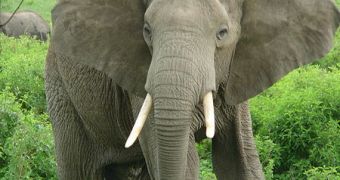Currently, the Amboseli National Park, in Kenya, is the scene of some fairly unusual scientific studies. Researchers are trying to investigate some very specific traits that elephants may have, that could change the way we understand their intelligence forever. According to experts, the brain power these animals exhibit may actually be only a portion of their overall ability to think, and so various groups set out to test that. Some scientists are focusing on whether elephants can determine the age of other elephants, while others are trying to study if they can recognize various languages. Additional studies have been conducted on whether the large animals can count lions, the BBC News reports.
The thing about elephants is that they do not have such a good sense of sight. They perceive things a lot less clearly than we do, for example, but compensate for that with a keen sense of hearing. This allows them to communicate with each other using a wide range of noises, going well into the infrasonic range. On top of that, they have one of the most amazingly-developed sense of smell in the animal world, which also contributes significantly to their ability to create a mental image of the environment they are navigating, and most things within.
Taking advantage of this knowledge, researchers have been leaving scents that the animals would meet in nature, but placed in such a manner that observing the elephants as they investigate the marks could shed some light on their thought processes. The same thing was done with sounds as well, as scientists mounted large speakers on the back of a jeep, and began driving through the Park. “They've proved to have abilities which have only been found elsewhere in the great apes and humans. We are a bit limited by how little we know about elephants, but the odd glimmers we get seem to be rather remarkable,” says St Andrew's University professor of evolutionary psychology Dick Byrne.
Elephants in the Amboseli Park are regularly exposed to three different human languages – the Maa (spoken by the Maasai ethnic group), the Kamba language, spoken by the people of the same name, and English from park tourists. Studying whether the elephants recognize these languages was easy, given that the Maasai and the elephants do not get along very well. Some of the animals leave the reserve and kill Maasai cattle, and the occasional human, and so, in retaliation, young warriors spear an elephant. The researchers thought they should use that to their advantage, and played back the Maasai language on the jeep-mounted speakers.
Experts say that, when elephants hear Maa being spoken, they become restless, nervous and agitated. On the other hand, if the same speaker switches to the Swahili language, the animals calm down again. The study has just begun, so experts still have a long way to go before they are able to say for sure if the elephants can tell languages apart.

 14 DAY TRIAL //
14 DAY TRIAL //